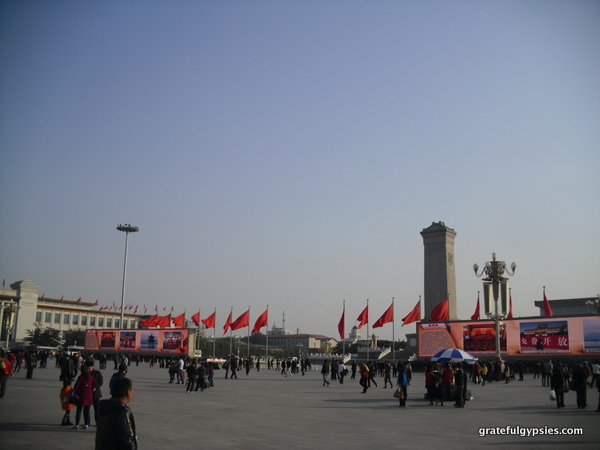China’s National Anthem Posted by sasha on Oct 1, 2015 in Culture, Vocabulary
Today is National Day (国庆节 – guó qìng jié) in China, commemorating the day Mao Zedong established the People’s Republic of China back in 1949. On this day, thousands upon thousands of patriotic Chinese gather in Tiananmen Square to celebrate this important holiday. Those who are very dedicated make it to the square at sunrise to take in the flag raising ceremony. And what better way to show off your true patriotism than singing along to the national anthem (国歌 – guó gē)? For a little lesson in Chinese language and culture, let’s take a closer look at the song.

Tiananmen Square – the heart of China.
Background Info.
China’s national anthem is called “March of the Volunteers” (义勇军进行曲 – yì yǒng jūn jìn xíng qǔ). The lyrics were written by Tian Han (田汉), a poet and playwright. Originally, they were part of his poem called “The Great Wall” (万里长城 – wàn lǐ cháng chéng) and were intended for use in a play or film. Composer Nie Er (聂耳) set the words to music while in Japan, where he would die an untimely death while swimming at the age of just 23. In June of 1949, a committee was established to choose a national anthem for the soon-to-be-formed PRC. Out of nearly 700 entries, “The March of the Volunteers” was chosen. It became the provisional anthem just days before Mao established a new China, and it would eventually become the official anthem in 1982. Interestingly enough, there was a time in between when Tian Han’s words were forbidden to be sung, as he was imprisoned during the Cultural Revolution. At that time, “The East is Red” served as the country’s unofficial anthem. The song’s status as the anthem was even enshrined as an amendment to the constitution in 2004.
Lyrics
Although the lyrics have undergone some slight alterations throughout the years, they are now back to the original version. Here they are in Chinese, pinyin, and English:
Chinese
起来!不愿做奴隶的人们!
把我们的血肉,
筑成我们新的长城!
中华民族到了最危险的时候,
每个人被迫着发出最后的吼声。
起来!起来!起来!
我们万众一心,
冒着敌人的炮火,前进!
冒着敌人的炮火,前进!
前进!前进!进!
Pinyin
Qǐ lái! Bú yuàn zuò nú lì de rén men!
Bǎ wǒ men de xuè ròu,
zhù chéng wǒ men xīn de cháng chéng!
Zhōng huá mín zú dào liǎo zuì wēi xiǎn de shí hòu.
Měi ge rén bèi pò zhe fā chū zuì hòu de hǒu shēng.
Qǐ lái! Q ǐlái! Qǐ lái!
Wǒ men wàn zhòng yì xīn,
Mào zhe dí rén de pào huǒ, qián jìn!
Mào zhe dí rén de pào huǒ, qián jìn!
Qián jìn! Qián jìn! Jìn!
English
Arise, we who refuse to be slaves;
With our very flesh and blood
let us build our new Great Wall!
The peoples of China are at their most critical time,
Everybody must roar defiance.
Arise! Arise! Arise!
Millions of people become one,
Braving the enemy’s gunfire, March on!
Braving the enemy’s gunfire, March on!
March on! March on, on!
Videos
Now that you’ve got the backstory and the lyrics, follow along with the video. You can even try to sing it in Chinese!
For a full-blown nationalist display, check out this video from a military parade capped off with an epic flag raising ceremony:
To all 1.4 billion people in China, we’d like to wish you a…
Happy National Day!
国庆节快乐! (guó qìng jié kuài lè)

Build vocabulary, practice pronunciation, and more with Transparent Language Online. Available anytime, anywhere, on any device.
About the Author: sasha
Sasha is an English teacher, writer, photographer, and videographer from the great state of Michigan. Upon graduating from Michigan State University, he moved to China and spent 5+ years living, working, studying, and traveling there. He also studied Indonesian Language & Culture in Bali for a year. He and his wife run the travel blog Grateful Gypsies, and they're currently trying the digital nomad lifestyle across Latin America.




Comments:
Emmanuel:
I love Chinese language
Joy Hou:
Can I get to know Sasha? Sasha is so knowledegable.
sasha:
@Joy Hou Thanks for the kind words, Joy! I’m a part-time blogger for Transparent Language. You can also find my personal work on my page Grateful Gypsies. Feel free to reach out via any of our contact methods!